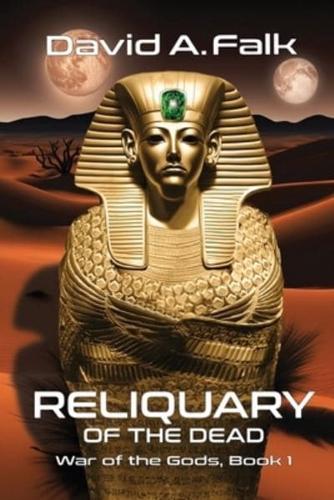Reliquary of the Dead
I read Reliquary of the Dead by @DrDavidAFalk. Overall a delightful novel, and also one that gives me an excuse to talk about two potential pitfalls in fiction writing.

The first is that specialists in any field other than fiction writing tend not to make very good fiction writers. They tend to be didactic regarding their field of interest, and not very convincing in terms of character and plot. They also tend to be narrowly educated in their field, with little experience or knowledge to inform the other elements of their story, resulting in glaring plot holes and technical mistakes. Dr. Falk delightfully averts this trope, demonstrating passable knowledge in a wide range of subjects needed for his story—which is a space exploration adventure! With aliens!
Color me surprised. An outer space ancient aliens romp from an actual Egyptologist, and it’s actually good! And fun! And not bogged down in attempts to teach us all how much everyone else gets wrong about Ancient Egypt. In fact, there’s almost no Ancient Egypt in it! This is a good thing, on Dr. Falk’s part, especially for a debut novel. It frees him to do what all fiction writers do: write as non-PhDs, based on research, but with a focus on character, plot, and fun.
Which leads me to the other phenomenon that tends to plague fiction writers: their sense of human psychology tends to be autobiographical. The famous example of this is Lord of the Flies, depicting the breakdown into savagery and tribalism of young boys stranded on a (resource-rich) island. Billed as an insightful indictment of human nature, it really ends up being an insightful window into the author’s nature, and meanwhile a group of actual school boys gets stranded on an island for months and has prayer every night and takes care of its members until drama-free rescue. The human condition is widely varied, and authors write what they know. They write as if all people are the kind of people with whom they are familiar.
Apparently, the kind of people Dr. Falk knows are a-holes. Our protagonist and every character he encounters, are socially inept, backstabbing children in adult bodies. Is academia of Ancient Egypt really so backbiting? We must presume so. And wonder if Dr. Falk needs a hug. That said, while the entire cast are steadfastly unlikable, we yet manage to come to like the protagonist and his loyal assistant/gunhand and root for them. The level of character dev here is on par for commercial fiction, but entertainingly idiosyncratic.
Dr. Falk proposes that, to resolve a politically sensitive and technically demanding crisis in a space colony on the verge of collapse, you need a man with a particular set of skills, and those are… the skills of a socially inept Egyptologist. And yet, he just about pulls it off, at least well enough to keep us entertained, and intrigued by his particular twist on the ancient alien concept.
Lastly, given the abrupt ending, expect a series.
Entertaining, thought provoking, educational, minimal bad language and no lascivious content. Fit for Christian audiences. Enjoy.